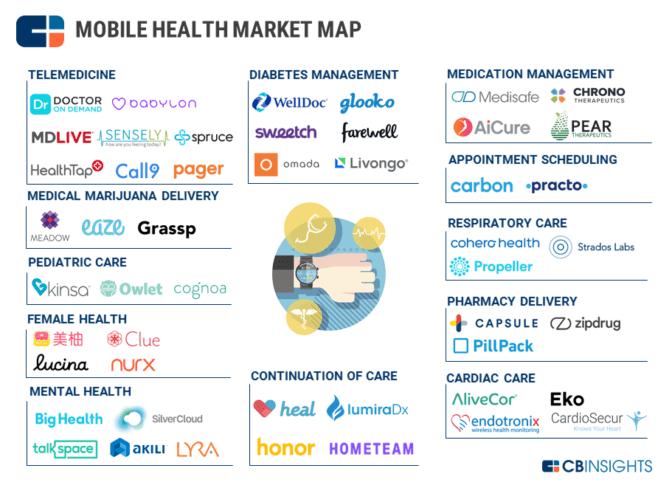Digital Health US: Startups fixing US healthcare sector
For over 100 years, the United States has struggled to create quality, equal healthcare for every citizen and yet year after year and administration after administration, it doesn’t happen. Often the concept of universal care is perceived as “social” medicine, which is viewed distasteful at best. The population and its elected officials have not been able to compromise freedom to choose with affordable access for all.
The whole of healthcare in the United States is a chaotic system.
No single player or industry commands interest either within the sector or against others. As such, a huge opportunity looms for startups that can leverage technology over embedded institutions.
Where to start?
With hundreds of start-ups in the Healthcare Information Technology sector, the playing field consists of multiple sectors approaching the issues with all technologies. If categorized by the applications such as appointment management, medications, diabetic care, here is a glimpse of but a few and their startup participants; however, these entities can easily spread over more than one category.

Image courtesy of CB Insights
Another approach to understanding the healthcare startup landscape is how the Healthcare Information & Management Systems Society (HIMSS) North America slices the industry into 5 technologies for the upcoming conference in Las Vegas, NV, 5-9 March 2018.
- Cloud Computing
- Digital & personal connected health
- Machine Learning & Artificial Intelligence
- Patient Engagement & Experience
- Revenue Cycle
These are the forums for discussion that broach the broad challenges for healthcare IT, vice specific applications. These sessions cover the opportunities and drawbacks for technology in healthcare. Their broad spectrum also reflects the characteristic deployment of more than one technology for a given solution.
Again though, it’s a wild tangle of interests and aptitudes which can be interpreted and evaluated several ways.
| Recommended for you | |
| Understanding the US healthcare system: How did we get here? | |
| Current state of US healthcare system: What lies ahead 2018 and beyond? | |
| Can startups fix the Indian healthcare system? |
Where do I fit in?
Startups should begin inserting themselves either with the technology they have mastered or with an application industry where they are experts and map to the other accordingly. Consider the intersection of functional and technology application and capitalize with upending the status quo.
As such, the best opportunity for startups is leveraging technology over embedded institutions. Think like Uber and Lyft who didn’t improve taxi service; they all but replaced it.
Taxi service has been a fairly universal experience: firmly entrenched in major cities and equally known for being an expensive and unpleasant necessity. Uber doesn’t train a new fleet of drivers to be nice or even promise to provide a cheaper ride. Uber and Lyft use technology to provide a platform whereupon the drivers self-organized and are HAPPY to drive. The ability of self-employees to get more business depends upon ensuring the rider’s experience is good – from the friendly, safe driving to a clean car. Poignantly, taxi service failed when they thought adding digital advertising would be improving their service.
Uber and Lyft also uprooted the pricing model by providing the customer with the cost upfront – from which the driver could choose to accept as well. Riders no longer wrote a blank check when they needed a ride. Uber and Lyft saw the dysfunction, married it to a saturated, competent technology and upset a given institution.
The US healthcare industry has many, many more pervasive problems and therefore plentiful opportunity to do the same as Uber and Lyft in the healthcare direction.
Think in the standard business practice and focus on the pain points. How can a startup address one or more of the issues facing US citizens that need better healthcare, or maybe even those that don’t have healthcare right now.
Which areas are too deeply entrenched or resistant to change?
In healthcare – like many industries – technology is driving the game; however, technology is a moving target. Any start-up needs to incorporate a solid business solution that is supported by technology and not vice versa. Otherwise, the target will always be moving and seldom hit successfully.
What will not change is the American state of mind about healthcare. US citizens will continue to think independent over universal coverage. This mindset is a deeply embedded culture.
Undoubtedly, although the belief still remains that healthcare should be affordable for everyone, it will be proportionate and not equal between wealthy and working class.
Costs will not be controlled so much as succumb to the “natural hand” of economics. A startup should then focus either on providing the minimum for mass numbers or the high dollar service for a select niche.
What can we expect in the next 5 years?
In consideration of over 100 years of Presidential efforts to create or legalize or just plain encourage a better healthcare system, efforts from the White House and Congress are unlikely to have success. The Trump administration continues to be at odds with Congress and the public on many significant issues. Healthcare may be in the top 5 for importance; however, a solid American healthcare system would need an alignment of multiple stars that are unlikely to appear anytime soon. Bottom line: more of the same.
Healthcare IT is an ideal market for startups. The field is wide open for game-changers that can leverage technology to solve the pressure points in the healthcare systems. Choose wisely, solve a problem and success is likely.
Image credit: www.istockphoto.com

















